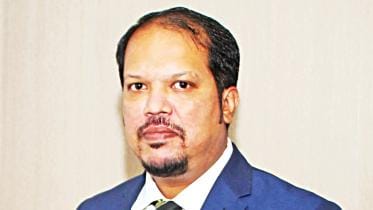Remittance boom faces an AI test
Considering the core economic indicators of Bangladesh, remittance inflow has become the strongest factor at present, driven by a historic surge. Remittances crossed $30 billion in the last fiscal year 2024-25, helping to stabilise the exchange rate and bolster foreign currency reserves.
17 December 2025, 18:00 PM
Why the economy lost its way
Bangladesh has been suffering from a mix of micro and macroeconomic pressures since August 2024. The banking sector, already weakened over many years, is now in trouble, marked by a capital shortfall, soaring non-performing loans (NPLs), and corruption.
19 November 2025, 18:00 PM
Slow GDP growth poses serious social consequences
The national economy of Bangladesh is facing one of its toughest tests in decades. The provisional GDP growth for this fiscal year is only 3.97 percent, the lowest in 34 years apart from the pandemic period. It is true that a sluggish growth rate can have different interpretations when compared with previous years, but few can deny the adverse state of many economic indicators even after more than a year of the interim government.
1 October 2025, 18:00 PM
The impact of private sector credit slowdown
Private sector credit growth fell to 6.4 percent in June 2025, the lowest in 22 years. This alarming number reflects the immense strain on the national economy, a slump not seen since the early 2000s. But the fading momentum goes beyond statistics. It is a pulse check on our economic strength, and the social cost of falling credit is immense.
24 August 2025, 18:00 PM
Taka devaluation and the path ahead
The economy of Bangladesh is currently undergoing several reforms and adjustments. However, in recent times, currency devaluation and rising inflation have shaken households, small businesses and industries, forcing painful changes at every level. Many are asking how this devaluation affects the people, and how stability can be regained.
5 August 2025, 18:00 PM
Embedded finance and the promise for CMSMEs
Cottage, Micro, Small & Medium Enterprises (CMSMEs), although being key contributors to Bangladesh’s national GDP growth, remain stifled by limited access to finance, markets, and digital tools.
21 July 2025, 18:00 PM
Market access is the missing link for CMSMEs
In Bangladesh, we cannot think of a holistic economy without attending to the CMSME sector. From rural artisans to urban tech start-ups, CMSMEs are everywhere, creating jobs, generating income, and driving inclusive growth. Over the past decade, it is evident that the Bangladesh Bank, along with private commercial banks, has made significant strides in improving access to finance. This effort continues to evolve.
25 June 2025, 18:00 PM
The road from cheap labour to a skilled workforce
Our country has long been recognised for its abundant labour force. In addition, this abundance has often been labelled as “cheap labour”, a term that underscores a missed opportunity for a prospective nation.
12 May 2025, 18:00 PM
Navigating pathways post-LDC graduation
Bangladesh is on the verge of graduating from the least developed country (LDC) category in 2026, which will be a significant milestone in the history of its economic journey.
7 April 2025, 18:00 PM
Closure of weak banks: to be or not to be?
Years of corruption, mismanagement, fragile governance and bank looting have left several banks in distress in Bangladesh.
3 March 2025, 18:00 PM
Combating financial scams in banking system
Remarkably, the pandemic has acted as a blessing for digital services and dramatically transformed our financial setting, steering it in a nature where digital banking has renewed as an easy solution in our everyday lives.
23 February 2025, 18:00 PM
SMEs: Start locally, think globally
Since the country’s independence in 1971, small and medium enterprises (SMEs) have played a pivotal role in GDP growth, employment, income generation, and local development.
21 January 2025, 18:00 PM
New loan classification policy a double-edged sword
Starting from the pandemic in 2020, Bangladesh as a nation has gone through a number of incidents in the last five years followed by the Ukraine war, interest rate capping, dollar crisis, high inflation, sluggish GDP growth, banking sector exploitation, intense corruption in different layers and lastly the political changeover in August.
15 December 2024, 18:00 PM
Building a loyal customer base
Talking about any industry from anywhere on the globe, customer loyalty stands as the foundation for a stable and long-term business venture. Considering Bangladesh, where market dynamics are very complex and rapidly evolving, nurturing customer loyalty is more crucial.
23 October 2024, 18:00 PM
The way out for weak banks
The banking sector of Bangladesh has expanded over the years in terms of the number of formal financial institutes and types of financing instruments and products available in the country.
15 September 2024, 18:00 PM
Interim govt’s path to financial stability
Following the fall of the Sheikh Hasina-led government on August 5, Bangladesh as a nation finds itself at a critical crossroads. The subsequent political turmoil has left the country’s financial sector in a fragile position, calling for urgent strategic plans and decisive execution of ideas by the interim government. As Bangladesh stands on the brink of graduating from least developed country (LDC) status in 2026, the priorities of the interim government must be clear.
1 September 2024, 18:00 PM
Ecommerce a path to progress for SMEs in Bangladesh
In general, e-commerce is the exchange of goods and services, and the transmission of funds and data over internet. It is governed by technology and digital platforms, including websites, mobile apps and social media, which make buying and selling more feasible.
26 June 2024, 18:00 PM
How to build a sustainable, ethical, and profitable business
The temptation to prioritise quick profits over long-term sustainability and ethics is predominant.
4 June 2024, 18:05 PM
Building a brand
The word brand means a product, service or concept that is evidently distinguished from other products, services or concepts so that it can be simply communicated and frequently marketed.
19 May 2024, 18:05 PM
SOS from SMEs
Micro, small, and medium enterprises (MSMEs), thanks to their entrepreneurial spirit and agility, have emerged as the heart of the growing economy of Bangladesh and the backbone of the financial ecosystem.
24 April 2024, 18:01 PM














